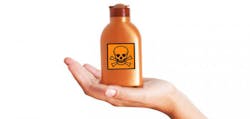Rite Aid Expanding List of Restricted Chemicals to Address Consumer Concern
As part of Rite Aid ’s ongoing efforts to meet customer expectations for chemical management and product safety, the company announced on Sept. 13 that it has established its Chemical Policy and expanded Restricted Substances List.
“As a company, we remain committed to working closely with our supplier partners to provide our customers with the effective products they need while avoiding the use of chemicals of concern,” said William Renz, Rite Aid senior vice president of category management.
Rite Aid has been working closely with supplier partners to eliminate eight high-priority chemicals from formulated private brand items since 2016. These chemicals include triclosan, formaldehyde, toluene, butylparaben, propylparaben, dibutyl phthalate, diethyl phthalate and nonylphenol ethoxylates.
As a result, the vast majority of the company’s private brand portfolio currently complies with these standards and Rite Aid remains on track to fully eliminate these chemicals from private brand items by 2020.
Rite Aid has also expanded its Restricted Substances List (RSL) to go beyond these eight high-priority chemicals as well as existing U.S. regulatory requirements. The expanded RSL brings additional parabens, phthalates, nonylphenol ethoxylates (NPEs) and formaldehyde donors within the scope of Rite Aid’s efforts to reduce the use of chemicals of concern, bringing the total number of restricted chemicals from eight to 69. Rite Aid’s updated RS. (The company's policy can be found here.)
Rite Aid will begin implementing UL’s WERCsmart and PURview platforms. in order to provide more robust screening, tracking, monitoring and reporting capabilities. With an expanded RSL and new technology, the company is also extending the scope of its chemical management program to include formulated items made by national brands.
As part of the company’s efforts, Rite Aid has been engaging with Safer Chemicals, Healthy Families and its Mind the Store Campaign. The organization leads a coalition of more than 450 organizations and businesses that encourage retailers to replace chemicals of concern with safer alternatives.
“We applaud Rite Aid for restricting these harmful chemicals and developing a comprehensive safer chemicals policy,” said Mike Schade, Mind the Store Campaign Director for Safer Chemicals, Healthy Families. “This will go a long way in meeting the rising consumer demand for safer and healthier products. Retailers like Rite Aid can play an important role in driving harmful chemicals out of commerce and promoting safer alternatives.”
About the Author
EHS Today Staff
EHS Today's editorial staff includes:
Dave Blanchard, Editor-in-Chief: During his career Dave has led the editorial management of many of Endeavor Business Media's best-known brands, including IndustryWeek, EHS Today, Material Handling & Logistics, Logistics Today, Supply Chain Technology News, and Business Finance. In addition, he serves as senior content director of the annual Safety Leadership Conference. With over 30 years of B2B media experience, Dave literally wrote the book on supply chain management, Supply Chain Management Best Practices (John Wiley & Sons, 2021), which has been translated into several languages and is currently in its third edition. He is a frequent speaker and moderator at major trade shows and conferences, and has won numerous awards for writing and editing. He is a voting member of the jury of the Logistics Hall of Fame, and is a graduate of Northern Illinois University.
Adrienne Selko, Senior Editor: In addition to her roles with EHS Today and the Safety Leadership Conference, Adrienne is also a senior editor at IndustryWeek and has written about many topics, with her current focus on workforce development strategies. She is also a senior editor at Material Handling & Logistics. Previously she was in corporate communications at a medical manufacturing company as well as a large regional bank. She is the author of Do I Have to Wear Garlic Around My Neck?, which made the Cleveland Plain Dealer's best sellers list.
Nicole Stempak, Managing Editor: Nicole Stempak is managing editor of EHS Today and conference content manager of the Safety Leadership Conference.
